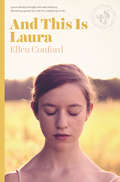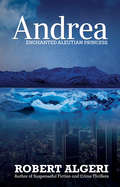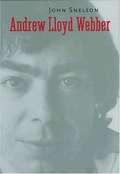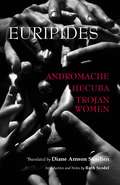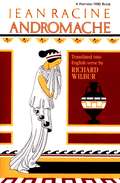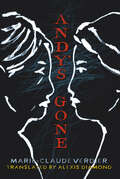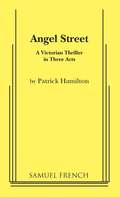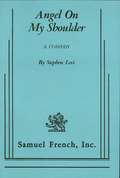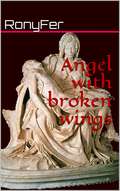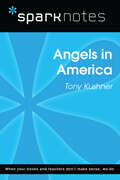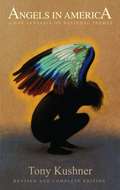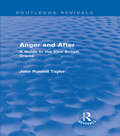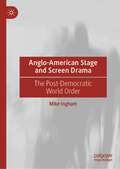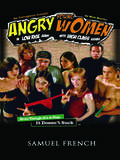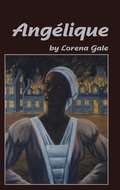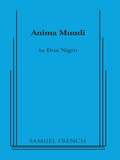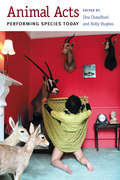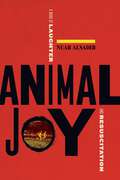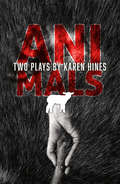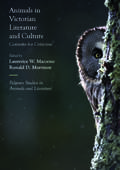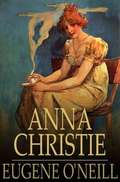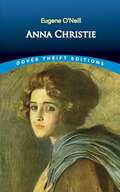- Table View
- List View
And This Is Laura
by Ellen ConfordAnd This Is Laura is the hilarious story of an average girl in a family of overachievers who learns she's not so average. Laura's oldest brother composes his own music and is a debate team champion; her sister is a star actress and bowler; her youngest brother is in the process of counting to a million. Laura? She's just an ordinary twelve-year old--that is, until she discovers that she can see the future. Suddenly, she has popularity, attention from her parents, even media coverage. It's new and great--until one day, a vision frightens her to the core.Ellen Conford is one of the most prolific and successful authors of young adult fiction. In addition to the popular Jenny Archer and Annabel the Actress series, Conford has written over thirty novels. She has received numerous awards, notably an ALA Best Book of the Year citation.
Andrea: Enchanted Aleutian Pricess
by Robert AlgeriI met Andrea Altiery in 1981; the first thing she asked was, “Do you like the rock band Aerosmith?” I responded, “Yes.” She smiled and slapped me on my left shoulder telling me, “Dream on my friend.” Later that year Andrea was taken from us by the most notorious serial killer to ever hunt in the state of Alaska. Get ready to collectively ride an emotional ride through urban Alaska while looking through a steamy window for lost love; love that's never found and love that maybe never was. I can only imagine the helplessness; the complete feeling of being alone these women had; Andrea must have had, preyed upon all of their spirit's gathering together now. Victims of circumstance; none of these women deserved to be mistreated like Andrea; dehumanized, erased from our minds. One last chance to give Andrea a voice, each woman asking us can you hear me, do you see me now?
Andrew Lloyd Webber
by John SnelsonAndrew Lloyd Webber is the most famous--and most controversial--composer of musical theater alive today. Hundreds of millions of people have seen his musicals, which include Cats, The Phantom of the Opera, Starlight Express, Joseph and the Amazing Technicolor Dreamcoat, Jesus Christ Superstar, Evita, and Sunset Boulevard. Even more know his songs. Lloyd Webber's many awards include seven Tonys and three Grammys--but he has nonetheless been the subject of greater critical vitriol than any of his artistic peers. Why have both the man and his work provoked such extreme responses? Does he challenge his audiences, or merely recycle the comfortable and familiar? Over three decades, how has Lloyd Webber changed fundamentally what a musical can be? In this sustained examination of Lloyd Webber's creative career, the music scholar John Snelson explores the vast range of influences that have informed Lloyd Webber's work, from film, rock, and pop music to Lloyd Webber's own life story. This rigorous and sympathetic survey will be essential reading for anyone interested in Lloyd Webber's musicals and the world of modern musical theater that he has been so instrumental in shaping.
Androcles and the Lion
by George Bernard Shaw Dan LaurenceAndrocles and the Lion is a 1912 play written by George Bernard Shaw.Androcles and the Lion is Shaw's retelling of the tale of Androcles, a slave who is saved by the requited mercy of a lion. In the play, Shaw makes Androcles out to be one of many Christians being led to the Colosseum for torture. Characters in the play exemplify several themes and takes on both modern and supposed early Christianity, including cultural clash between Jesus' teachings and traditional Roman values.
Andromache, Hecuba, Trojan Women
by Euripides Ruth Scodel Diane Arnson SvarlienDiane Arnson Svarlien's translation of Euripides' Andromache, Hecuba, and Trojan Women exhibits the same scholarly and poetic standards that have won praise for her Alcestis, Medea, Hippolytus. Ruth Scodel's Introduction examines the cultural and political context in which Euripides wrote, and provides analysis of the themes, structure, and characters of the plays included. Her notes offer expert guidance to readers encountering these works for the first time.
Andromache, by Racine
by Richard WilburA skillful translation of the classical French tragedy about the captivity of Hector's wife after her abduction by the son of Achilles. The rhymed couplets retain the simplicity of form and powerful language of the original. "[This translation] is a striking tour de force" (Hudson Review). Drawings by Igor Tulipanov.
Andy's Gone
by Marie-Claude VerdierWhat stories do we tell ourselves to keep our walls up and our privilege intact? What is the cost of revolution? In this contemporary retelling of Antigone, denial of what rages outside of a city’s perimeter comes to a head when a young princess named Alison tries to expose the truth of her beloved cousin Henry’s death. By night, Henry went as Andy, as together he and Alison scaled the walls of their kingdom to help the migrants who are kept out of sight. Burdened by the weight of the inequality that his future reign represented, he killed himself. But his mother, Queen Regina, hails his death as a valiant knight and will do anything she can to keep Alison silent. The two women become locked in a poetic battle of power and prejudice, until a push turning into a shove might mean it’s too late to find peace.
Angel Street
by Patrick HamiltonMelodrama, 2 m, 3 f, 2 extras; A Broadway hit first produced on the West End under the title Gaslight and filmed twice, Angel Street tells the story of the Manninghams who live on Angel Street in 19th Century London. As the curtain rises, all appears the essence of Victorian tranquility. It is soon apparent however, that Mr. Manningham, a suavely handsome man, is slowly driving his gentle, devoted wife Bella, to the brink of insanity with an insinuating kindness which masks more sinsister motives. While he is out, Mrs. Manningham has an unexpected caller: amiable, paternal Inspector Rough from Scotland Yard. Rough is convinced that Manningham is a homicidal maniac wanted for a murder committed fifteen years earlier in this very house. Gradually the inspector restores Bella's confidence in herself and as the evidence against Manningham unfolds, the author has built and sustained some of the most brilliant, suspenseful sequences in modern theatre.
Angel on My Shoulder: A Comedy
by Stephen LeviA beautiful young book illustrator is having an affair with her dream man, a ruggedly attractive owner of a demolition company. When he announces his intention to leave his family, Donna gets looped and awakes in the arms of an angelic looking man with "Wings" printed on his sweat shirt. He seems to know everything about her, including her present predicament. Complications ensue when the lover shows up suitcase in hand to discover Donna is sharing her apartment with her "guardian angel." Laughs and surprises come fast and furious as the men vie for Donna's affections.
Angel with broken wings
by Ronyfer Federico RenziStories of struggle and perseverance of one of the many political refugees who had to leave their Latin American country to try their luck in one of the countries called "first world". Juan Ramon emigrated from his native Guatemala to take refuge with his wife Flor de Maria, escaping from the institutionalized repression, to face the cold and xenophobic Canadian society.Then; he suffers, as so many thousands of displaced and dispossessed who have lost everything. Or almost everything; because it perseverance, courage, love of life and capacity for solidarity is.
Angels in America (SparkNotes Literature Guide Series)
by SparkNotesAngels in America (SparkNotes Literature Guide) by Tony Kushner Making the reading experience fun! Created by Harvard students for students everywhere, SparkNotes is a new breed of study guide: smarter, better, faster.Geared to what today's students need to know, SparkNotes provides:*chapter-by-chapter analysis *explanations of key themes, motifs, and symbols *a review quiz and essay topics Lively and accessible, these guides are perfect for late-night studying and writing papers.
Angels in America: A Gay Fantasia on National Themes
by Tony Kushner<p>Winner of the Pulitzer Prize for Drama <p>Angels in America: A Gay Fantasia on National Themes includes Part One, Millennium Approaches and Part Two, Perestroika <p>This new edition of Tony Kushner's masterpiece is published with the author's recent changes and a new introduction in celebration of the twentieth anniversary of its original production. One of the most honored American plays in history, Angels in America was awarded two Tony Awards for Best Play and the Pulitzer Prize for Drama. It was made into an Emmy Award-winning HBO film directed by Mike Nichols. This two-part epic, subtitled "A Gay Fantasia on National Themes," has received hundreds of performances worldwide in more than twenty-six languages.</p>
Anger and After: A Guide to the New British Drama (Routledge Revivals)
by John Russell TaylorWhen it was first published in 1962, Anger and After was the first comprehensive study of the dramatic movement which began in 1956 with the staging of John Osborne’s Look Back in Anger and has since brought forward such dramatists as Brendan Behan, Harold Pinter, N. F. Simpson, John Arden and Arnold Wesker. Thoroughly revised in 1969, this book remains important reading for theatre students in need of a comprehensive and authoritative guide to post-Osborne drama in Britain.
Anglo-American Stage and Screen Drama: The Post-Democratic World Order
by Mike InghamAnglo-American Stage and Screen Drama analyses and discusses the contemporary role of stage and screen drama as a critical forum for progressive thinking in an increasingly polarised geopolitical world. The book addresses the cultural politics of socially engaged 21st century stage plays and films, and makes the case for drama as a sociopolitical forum, in which the complex and contentious issues that confront society can be explored and debated. It conceives of Anglophone political drama as a significant intervention in today’s culture wars, representing the latter as a convenient distraction from the ongoing depredations of neoliberalism. In the main part of the book selected case-study plays and films from each of the first two decades illustrate drama’s capacity to influence critical debate on social justice issues. All of the case-study texts under discussion express a powerful aesthetics of resistance to right-wing ideology, and promote inclusive and enlightened values. This broader orientation underlines drama’s role as a channel for critical agency in today’s putative post-socialist, post-democratic climate.
Angry Young Women in Low-Rise Jeans with High-Class Issues
by Matt MorilloComedy /6m, 7f (flexible casting if actors play multiple roles) / Simple Sets This outrageous new comedy is told in five outrageously funny parts and it's all about young women and the various issues they confront today. It's part sit-com, part stand-up comedy and part sketch-comedy. This collection of vignettes parades a series of foxy, witty and anxious women who bear the expectations of the world like an itchy muffler. These girls are coffee-driven, sensitive, wired, misunderstood and fuming with awkward issues. They are frustrated with the way of the world, the perceptions men have of them and their own reactions to it. How, for example, do you resolve contradictions like dressing as a hooker and still being a feminist? So they go head to head with such issues as Electra complexes, bikini waxes, low rider jeans, their oversexed mothers, thongs, brazen teenagers, men's sexual fantasies, side effects of birth control drugs, mean teenagers on the subway, sympathy sex and the artistic integrity of penises and vaginas in independent films. This play has great material for scene and monologue work as well as for performance.
Angélique
by Lorena Gale"And in seventeen thirty-four a Negro slave set fire to the City of Montreal and was hanged..." With this bald statement of history as a basis, Lorena Gale constructs a vivid portrait of a time when captive people had no say in the outcome of their lives. A rich, poetic evocation of a graceful yet cruel time—a time when “civilized” citizens still bought and sold slaves. This is a time when the thoughts and feelings of these captive people had no bearing on the outcome of their lives, unless they were outraged and brave enough to try and shake their bonds. Angélique is the winner of the du Maurier National Playwriting Competition and was nominated Outstanding New Play in Calgary’s Betty Mitchell Awards, 1998.
Anima Mundi
by Don NigroDrama \ 8m, 5f (with doubling). \ Unit set. \ A young American poet arrives in London at the turn of the century, falls in love with a troubled dancer and has his fortune told by Madame Blavatsky. Each tarot card triggers a vivid scene from his turbulent future. Yeats in the tower, the Satanist Alister Crowley, and cranky Ezra Pound in the mad house are there as well as Oscar Wilde among some French ladies of easy virtue, a shell shocked Everett in no man's land, the bitter ballplayer Rex, and the manic Captain Blood. At a wild seance, Wilde's ghost is summoned to discuss God and chocolate eclairs. This poetic play traces the young American's search for his elusive love, God and the meaning of art in a stunning tapestry of memories and nightmares. A National Play Award finalist, this magical drama is central to the author's cycle of Pendragon plays.
Animal Acts: Performing Species Today
by Holly Hughes Una ChaudhuriWe all have an animal story--the pet we loved, the wild animal that captured our childhood imagination, the deer the neighbor hit while driving. While scientific breakthroughs in animal cognition, the effects of global climate change and dwindling animal habitats, and the exploding interdisciplinary field of animal studies have complicated things, such stories remain a part of how we tell the story of being human. Animal Acts collects eleven exciting, provocative, and moving stories by solo performers, accompanied by commentary that places the works in a broader context. Work by leading theater artists Holly Hughes, Rachel Rosenthal, Deke Weaver, Carmelita Tropicana, and others joins commentary by major scholars including Donna Haraway, Jane Desmond, Jill Dolan, and Nigel Rothfels. Una Chaudhuri's introduction provides a vital foundation for understanding and appreciating the intersection of animal studies and performance. The anthology foregrounds questions of race, gender, sexuality, class, nation, and other issues central to the human project within the discourse of the "post human," and will appeal to readers interested in solo performance, animal studies, gender studies, performance studies, and environmental studies.
Animal Joy: A Book of Laughter and Resuscitation
by Nuar AlsadirA Time Must-Read Book of 2022 A Publishers Weekly Best Book of 2022Aster(ix) Journal's 12 Best Nonfiction Books of 2022An invigorating, continuously surprising book about the serious nature of laughter.Laughter shakes us out of our deadness. An outburst of spontaneous laughter is an eruption from the unconscious that, like political resistance, poetry, or self-revelation, expresses a provocative, impish drive to burst free from external constraints. Taking laughter’s revelatory capacity as a starting point, and rooted in Nuar Alsadir’s experience as a poet and psychoanalyst, Animal Joy seeks to recover the sensation of being present and embodied. Writing in a poetic, associative style, blending the personal with the theoretical, Alsadir ranges from her experience in clown school, Anna Karenina’s morphine addiction, Freud’s un-Freudian behaviors, marriage brokers and war brokers, to “Not Jokes,” Abu Ghraib, Frantz’s negrophobia, smut, the Brett Kavanaugh hearings, laugh tracks, the problem with adjectives, and how poetry can wake us up. At the center of the book, however, is the author’s relationship with her daughters, who erupt into the text like sudden, unexpected laughter. These interventions—frank, tender, and always a challenge to the writer and her thinking—are like tiny revolutions, pointedly showing the dangers of being severed from one’s true self and hinting at ways one might be called back to it.A bold and insatiably curious prose debut, Animal Joy is an ode to spontaneity and feeling alive.
Animals
by Karen Hines‘I used to want a black enamel farmhouse sink. Now, I just want shelter.’ From acclaimed playwright Karen Hines come two darkly comic meditations on security, safety, and shelter. Crawlspace is a comic, Kafkaesque monologue about the darker side of home ownership that moves past ‘cautionary’ as it snakes through the brutal battleground of Toronto real estate, decorative twig orbs, and the state of the human soul. All the Little Animals I Have Eaten explores questions surrounding existence, death, and salvation through the perspectives of one sleep-deprived young woman, the ghosts of brilliant authors, some well-heeled professionals, meth-curious lambs, a puppet in a beatnik onesie, tiny vertebrates, glowing arthropods, and other unexpected voices. Praise for the Videofag production of Crawlspace: ‘Karen Hines’s macabre monologue about a real-estate nightmare – and a dead animal stuck in a crawlspace – was all the more terrifying for being true. This was Hines at her most horrifyingly hilarious.’ – Globe and Mail ‘Hines’s clever script, alternately savagely funny and disturbing, is full of facts the author keeps amending, underlining the bait-and-switch nature of the real estate swindle.’ – NOW magazine ‘The kind of story you want to talk about as soon as you get home. Horrifying and enlightening.’ – Mooney on Theatre
Animals in Victorian Literature and Culture: Contexts for Criticism (Palgrave Studies in Animals and Literature)
by Laurence W. Mazzeno Ronald D. MorrisonThis collection includes twelve provocative essays from a diverse group of international scholars, who utilize a range of interdisciplinary approaches to analyze "real" and "representational" animals that stand out as culturally significant to Victorian literature and culture. Essays focus on a wide range of canonical and non-canonical Victorian writers, including Charles Dickens, Anthony Trollope, Anna Sewell, Emily Bronte, James Thomson, Christina Rossetti, and Richard Marsh, and they focus on a diverse array of forms: fiction, poetry, journalism, and letters. These essays consider a wide range of cultural attitudes and literary treatments of animals in the Victorian Age, including the development of the animal protection movement, the importation of animals from the expanding Empire, the acclimatization of British animals in other countries, and the problems associated with increasing pet ownership. The collection also includes an Introduction co-written by the editors and Suggestions for Further Study, and will prove of interest to scholars and students across the multiple disciplines which comprise Animal Studies.
Animals: Two Plays
by Karen Hines‘I used to want a black enamel farmhouse sink. Now, I just want shelter.’ From acclaimed playwright Karen Hines come two darkly comic meditations on security, safety, and shelter. Crawlspace is a comic, Kafkaesque monologue about the darker side of home ownership that moves past ‘cautionary’ as it snakes through the brutal battleground of Toronto real estate, decorative twig orbs, and the state of the human soul. All the Little Animals I Have Eaten explores questions surrounding existence, death, and salvation through the perspectives of one sleep-deprived young woman, the ghosts of brilliant authors, some well-heeled professionals, meth-curious lambs, a puppet in a beatnik onesie, tiny vertebrates, glowing arthropods, and other unexpected voices. Praise for the Videofag production of Crawlspace: ‘Karen Hines’s macabre monologue about a real-estate nightmare – and a dead animal stuck in a crawlspace – was all the more terrifying for being true. This was Hines at her most horrifyingly hilarious.’ – Globe and Mail ‘Hines’s clever script, alternately savagely funny and disturbing, is full of facts the author keeps amending, underlining the bait-and-switch nature of the real estate swindle.’ – NOW magazine ‘The kind of story you want to talk about as soon as you get home. Horrifying and enlightening.’ – Mooney on Theatre
Anna Christie
by Eugene O'NeillEarly in his career, Eugene O'Neill (1888-1953) wrote a series of plays revolving around characters obsessed with the sea. This period culminated in the 1922 production of Anna Christie, a drama of social realism that was among the first of the author's plays to explore characters searching for their own identities. Centering on the reunion of a barge captain and his daughter after a twenty-year separation, the play derives its tension from the former's disaffection for the seafaring life and the latter's love for a sailor. The father-daughter conflict elicits a shocking confession, which illuminates the author's contention that character is fate and the seemingly external forces controlling destiny actually lie within<P><P> .Anna Christie amply displays O'Neill's extraordinary insights into character and his masterly use of language, qualities that have earned him acclaim as one of America's greatest playwrights. Students and lovers of modern theater will prize this inexpensive edition of his landmark drama.<P> Pulitzer Prize Winner
Anna Christie (Dover Thrift Editions)
by Eugene O'NeillEarly in his career, Eugene O'Neill (1888-1953) wrote a series of plays revolving around characters obsessed with the sea. This period culminated in the 1922 production of Anna Christie, a drama of social realism that was among the first of the author's plays to explore characters searching for their own identities. Centering on the reunion of a barge captain and his daughter after a twenty-year separation, the play derives its tension from the former's disaffection for the seafaring life and the latter's love for a sailor. The father-daughter conflict elicits a shocking confession, which illuminates the author's contention that character is fate and the seemingly external forces controlling destiny actually lie within<P><P> .Anna Christie amply displays O'Neill's extraordinary insights into character and his masterly use of language, qualities that have earned him acclaim as one of America's greatest playwrights. Students and lovers of modern theater will prize this inexpensive edition of his landmark drama.<P> Pulitzer Prize Winner
